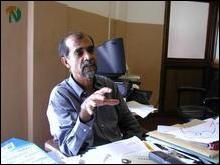Political engagement with LTTE vital to avoid estrangement - Uyangoda
[TamilNet, Friday, 28 November 2003, 12:22 GMT]
"The negotiation process needs to be revived soon. The exploration of the conditions under which the next phase of talks might take place should not be delayed under the pretext of either the political negotiations between the UNF and SLFP or the budget debate. Otherwise...a new process of estrangement between the Sinhalese and Tamil polities might emerge under the conditions of uncertainty created by the present process of no war-no peace," said Prof. Jeyadeva Uyangoda in an article which appeared in Friday edition of Daily mirror.
Prof. Uyangoda, Head of the Department of Political Science, Colombo University, questioned if the "Southern polity [is] ready to do serious political business with the LTTE?" and warned that "unless the Sinhalese political class makes up its mind in the next few weeks to do pretty serious political business with the LTTE in the coming months, the paths of political change in the North and the South may not perhaps intersect again for some time to come."
Noting that there is widespread disappointment among the Tamil people "over the inability demonstrated so far by the Sinhalese leadership to offer a serious and constructive response to the LTTE proposals," Prof.Uyangoda again warned, "any further delay in exploring constructive engagement with the LTTE around the ISGA proposals would undermine the confidence of the Tamil people on the peace process well as the capacity of the Sinhalese political leadership to do serious politics with the North."
'Conditionality approach,' he said, insists that "political dealings with the LTTE should be conditional to the demonstration by the latter that its behaviour concurs with the norms and standards as set out by the international community." He labelled the approach to peace by the Peoples Alliance as 'hard conditionality', backed up by the military strength and UNF's approach as 'soft conditionality' backed by international support.
He articulated that there is also an alternative 'transformatory approach' which "argues that political engagement with the LTTE should not be conditional, since it is the political engagement alone that would build capacities within the LTTE and Tamil society for much the needed democratic transformation."
"There is emphasis [in this approach] on the acknowledgement as well as recognition of the major concessions made by the LTTE as constituting an acceptable starting point for political engagement. The LTTE's unilateral shift from external to internal self-determination, its declared commitment to federalism, and the decision to engage with the Sri Lankan state through internationally facilitated talks in a background of a cease-fire agreement are the major concessions which the transformationists highlight," he said.
He added that although Sri Lanka's President and Prime Minister "have a generally shared understanding that the peace process should continue...what would be necessary is not a combination of their two contending approaches, but working out of a new approach that will enable them to engage the LTTE in a mutually-transformative framework," arguing that for the next phase of talks to be successful, "change and transformation should occur in the North as well as in the South."
Prof. Uyangoda was one of the Marxist rebels who led the armed insurrection to capture state power in 1971. He was incarcerated for many years after the rebellion was ruthlessly crushed by Sri Lankan armed forces.







